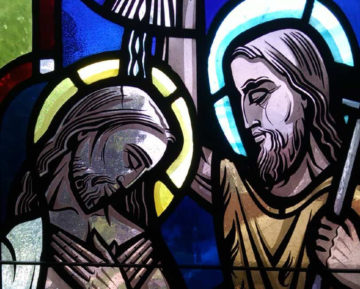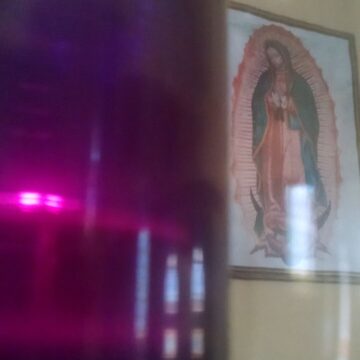Franciscan Friar Fr. Paul Gallagher reflects on the Gospel text for the Second Sunday of Advent. How do the events in our world and in your personal life affect your willingness to look for God’s working in the world and in your own life?
The content is edited by Franciscan Sister of Christian Charity Sister Anne Marie Lom and Joe Thiel. The excerpts from the Sunday readings are prepared by Joe Thiel. To read or download the complete pdf with excerpts for your prayer, please click here December 10 2023 Franciscan Gospel Reflection Excerpts are from the Lectionary for Mass for Use in the Dioceses of the United States of America, second typical edition © 2001, 1998, 1997, 1986, 1970 Confraternity of Christian Doctrine, Inc., Washington, DC. Used with permission. All rights reserved. No portion of this text may be reproduced by any means without permission in writing from the copyright owner. 
Mark 1:1-8
The beginning of the Gospel of Jesus Christ the Son of God. As it is written in Isaiah the prophet: “Behold, I am sending my messenger ahead of you; he will prepare your way. A voice of one crying out in the desert: ‘Prepare the way of the Lord, make straight his paths.'”
John the Baptist appeared in the desert proclaiming a baptism of repentance for the forgiveness of sins. People of the whole Judean countryside and all the inhabitants of Jerusalem were going out to him and were being baptized by him in the Jordan River as they acknowledged their sins.
John was clothed in camel’s hair, with a leather belt around his waist. He fed on locusts and wild honey. And this is what he proclaimed: “One mightier than I is coming after me. I am not worthy to stoop and loosen the thongs of his sandals. I have baptized you with water; he will baptize you with the Holy Spirit.”
Background:
Unlike Matthew and Luke, Mark’s Gospel does not begin with a genealogy. A genealogy was one way to explain why this son of a carpenter from the small town of Nazareth was worthy of a proclamation, a Gospel. In Jesus’ day, a proclamation was about the birth of a royal son or a military victory. Mark’s first verse, “The beginning of the Gospel of Jesus Christ, the Son of God,” is a proclamation that would have left the people of the day asking, “Who is this Jesus Christ?” They would also understand the phrase “son of” to mean, “Having the qualities of.” This proclamation is announcing that this Jesus Christ has the qualities of God and therefore, his birth must be proclaimed.
After the proclamation, Mark quotes the great prophet Isaiah, and he also draws on and reworks the prophet Malachi: “Lo, I am sending my messenger to prepare the way before me… And suddenly there will come to the temple the LORD whom you seek, and the messenger of the covenant whom you desire. Yes, he is coming, says the LORD of hosts. Lo, I will send you Elijah, the prophet, before the day of the LORD comes, the great and terrible day…” (Malachi 3:1, 23). Using the prophets Isaiah and Malachi, Mark introduces John as the one who prepares for the coming of Jesus. When the people of Israel were freed from Egyptian slavery, they were first led by God into the desert before they entered the promised land. This exodus experience became the model of liberation and encounter with God by which the Jews understand God working in and throughout their history. Mark draws on this understanding in presenting John the Baptist, the one in the desert who was preparing the way for one who has the qualities of God.
Unlike the Essenes, who practiced a ritual of washing that was meant only for those of their community, John’s baptism was for everyone. John proclaimed a message that was a call to repentance for the forgiveness of sins, and the coming of one mightier than himself. It was very possible that he was thinking more in terms of the coming of the Holy Spirit and the final reign of God. The great response to John indicates the people’s spiritual hunger. They may have gone to see the man who was clothed in camel hair and ate locusts. But they responded to his message by being baptized and by committing to making changes in their own lives. They were committing themselves to live a more faithful relationship with God.
Most peasants of day lived their daily life with an enormous burden of debt. The approaching “day of the Lord,” with its judgment and a time when all debts would be forgiven, would have been appealing. Unlike the Essenes, who became an isolated ascetical desert community who also waited for the day of the Lord, John’s message was focused on people returning to their families and their communities with a renewed dedication to their relationship with God.
Reflection Questions:
1. How do the events in our world and in your personal life affect your willingness to look for God’s working in the world and in your own life?
2. Can you recall other times of waiting in your life? (Waiting for a birth, whether you have been hired, waiting through a health issue…) What is your awareness of yourself in periods of waiting? Is the waiting that is asked of you this Advent different in some ways? Is it similar in other ways?
3. If you could ask God to show God’s presence in your life or in the world in some way, what would be your request? What would it be like for you to pray this Advent with that kind of desire?
4. Can your desire be God’s way of asking you to be part of God’s reign in the world?
5. Who are the people in your life who are deeply rooted in hope?
6. Why was John’s call to repentance and forgiveness so powerful for the people of the day?
7. Can you talk openly and honestly about your own desire for God’s presence in your life and in the world? What would that concretely mean for you and how you live?



